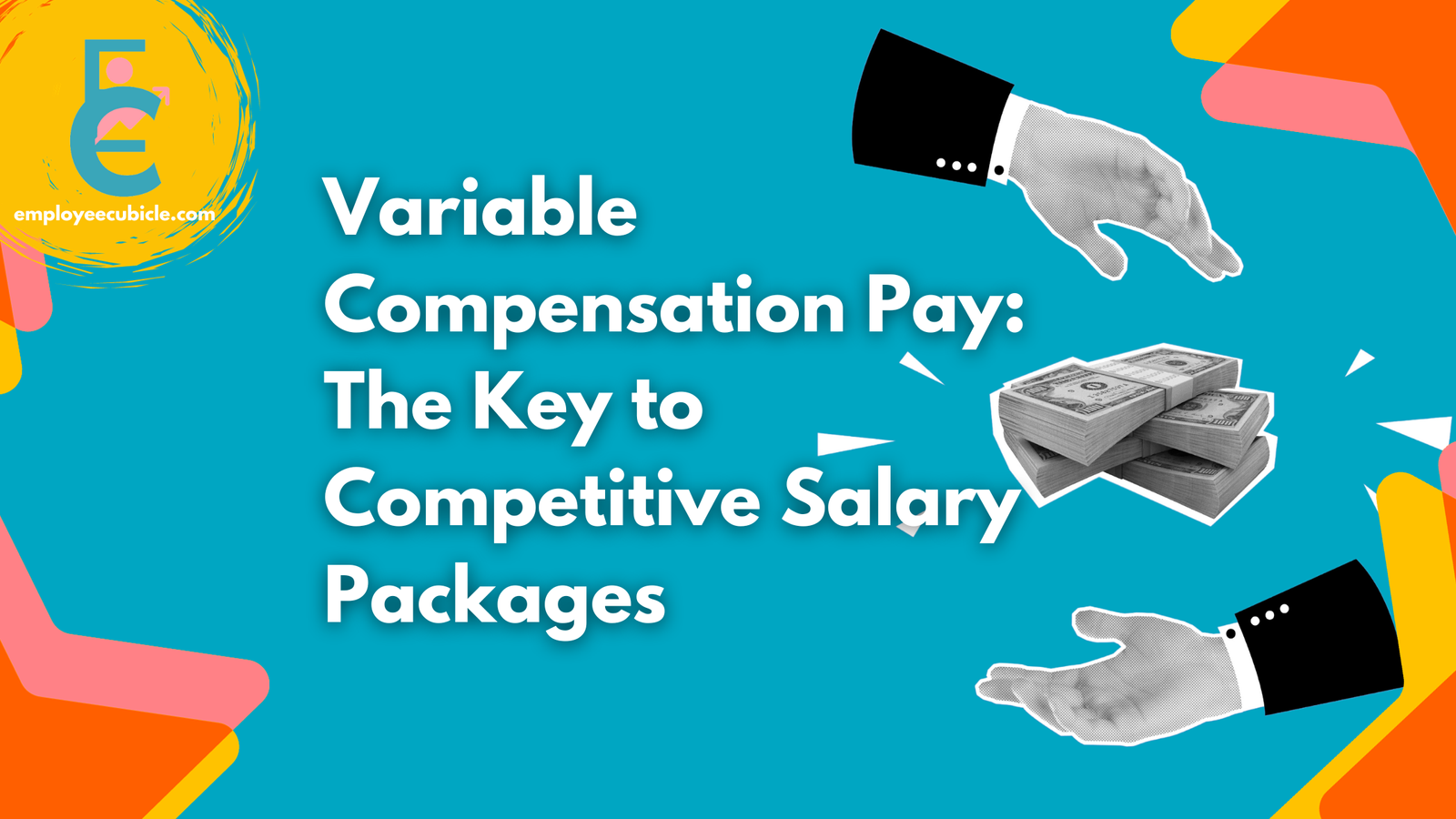Variable Compensation. It’s a term that has gained significant traction in today’s corporate world. But what is it? Why is it becoming so prevalent? Whether you’re just stepping into the professional world or you’ve been a part of it for years, understanding the intricacies of compensation can help you navigate your career and negotiate better. Let’s dive in!
Have you ever been rewarded for doing something exceptionally well? Maybe you aced a test in school or won a race. That extra prize, beyond the satisfaction of achievement, is a bit like variable compensation in the professional realm.
What is Variable Compensation?
Variable compensation refers to the portion of an employee’s pay that is contingent on performance, results, or other metrics, rather than a fixed and predetermined salary. It can take many forms, including bonuses, commissions, stock options, profit-sharing, and other performance-related rewards. The goal of variable compensation is often to motivate and reward employees for achieving specific results or exceeding certain benchmarks.
Think of it as the “cherry on top” of your salary. It’s the extra amount that varies depending on various factors, like your performance or the company’s success. For businesses, it’s a way to reward their star performers like Employee Of The Quarter and ensure they’re motivated to keep shining.
Fixed vs. Variable Compensation: What is the Difference?
Navigating the world of compensation can sometimes feel like picking between a cozy blanket and an exciting new book on a rainy day. Both have their unique allure. Let’s journey together into the ins and outs of fixed and variable compensation.
Fixed Compensation: The Steady Ship
Imagine setting sail on calm waters, where every wave’s rhythm is known, and there are no surprises.
- Assured Income:
- The beauty of fixed compensation lies in its predictability.
- No matter how the company performs or the market fluctuates, your paycheck remains the same.
- Peace of Mind:
- This consistency offers peace of mind, especially when you have fixed expenses like rent or monthly bills.
- There’s no need to constantly recalculate your budget.
Variable Compensation: The Adventure Ride
Venturing into the world of Variable Compensation is like hopping onto a roller coaster. There are highs, lows, and plenty of excitement.
- Dynamic Nature:
- As the name suggests, it varies. The thrill is in the unknown.
- It can be linked to individual performance, team achievements, or the company’s overall success.
- Motivation Boost:
- Nothing pushes you to reach for the stars quite like the allure of a bonus.
- This form of compensation can often lead to innovation and a proactive approach, as the rewards are directly tied to outcomes.
Diving Even Deeper: How Do They Compare?
- Security vs. Opportunity:
- Fixed compensation offers security. It’s the stable foundation of your earnings.
- Variable Compensation, on the other hand, is an opportunity to increase your earnings based on various factors.
- Employee vs. Employer Perspective:
- From an employee’s angle, fixed compensation provides financial stability. The Variable Compensation, while enticing, has its risks.
- For employers, fixed salaries are a constant expense, while variable compensations can be an effective tool to drive performance and align individual goals with the company’s objectives.
- Flexibility:
- Fixed compensation doesn’t typically change unless there’s a promotion, raise, or a contractual revision.
- Variable Compensation schemes can often be revisited and tweaked based on business needs, making them adaptable.
As you journey through your career, ponder what blend of the predictable ‘fixed’ and the exciting ‘variable’ suits your palette and financial goals best. After all, it’s all about crafting the perfect recipe for success!
What is Dual Variable Compensation?
Dual Variable Compensation refers to a compensation structure where employees can earn rewards based on two different sets of criteria or metrics. Instead of just one form of variable compensation—like a bonus based solely on individual performance—dual variable compensation provides two distinct avenues or opportunities for earning additional pay, often recognizing both individual achievements and broader team or company-wide successes.
Dual Variable Compensation—it’s like getting extra rewards in two different ways. Imagine you have two favorite ice cream flavors instead of one, and you can enjoy both at once. That’s what Dual Variable Compensation is all about—having two ways to make your earnings sweeter.

What is Dual Variable Compensation: Two Ways to Reward You
- First Way: Traditional Variable Compensation:
- This is like one of your favorite ice cream flavors, say, chocolate. It’s tied to how well you do your job individually, like meeting your goals or targets.
- Second Way: Extra Rewards Layer:
- Now, imagine adding some yummy sprinkles on top of your ice cream. This is like the second scoop of Dual Variable Compensation. It’s linked to different things, not just your individual work.
Why Have Two Ways? The Good Stuff
- Recognizing Different Achievements:
- Dual Variable Compensation helps your company say “good job” in different ways. It’s not just about your individual goals; it can also celebrate what your whole team or the company achieves.
- Getting Motivated from Many Places:
- Think of it like having more than one cheerleader cheering you on. You get motivated by different things, not just one set of goals.
Decoding the Compensation Structure
Let’s think of compensation as a puzzle. Each piece has its unique shape, and when put together, it creates a clear picture of how you’re rewarded for your hard work. Among these pieces, one that often raises curiosity is Variable Compensation. Let’s dive in and solve this puzzle together!
The Building Blocks of Compensation
- Base Salary: The Foundation
- This is your starting point. It’s the fixed amount you can expect in your bank account regularly. Think of it as the sky in our puzzle—always there and predictable.
- Variable Compensation: The Exciting Variable
- Just as some puzzle pieces have unique patterns and colors, Variable Compensation adds an interesting twist to your earnings.
- It’s not fixed; it can go up or down.
- Often linked to how well you do your job, how your team performs, or even how the entire company does.
- Just as some puzzle pieces have unique patterns and colors, Variable Compensation adds an interesting twist to your earnings.
- Benefits: The Extra Touches
- These are the additional perks that companies offer. It’s like the intricate details in the puzzle, from health insurance to gym memberships.
How to Calculate Variable Compensation?
Let’s simplify Variable Compensation into a neat little formula, much like solving a basic math problem. By the end, you’ll have a clear understanding of how it all adds up.

Breaking Down the Formula
Let’s take a closer look at the formula:
Variable Compensation=(Base Salary)+(Performance Multiplier)×(Variable Performance Component)
Here’s what each part means:
- Base Salary
This is the fixed part of your pay. It’s the regular amount you receive every month, like the cost of a basic meal.
- Performance Multiplier
Think of this as a rating or score based on your performance. If you’re doing a fantastic job, this number might be higher, similar to getting extra stars or points in a game.
- Variable Performance Component
This portion is an amount set aside for bonuses. But not everyone will get the full amount. It depends on the performance multiplier. It’s like a prize pot, and your performance decides how much you get from it.
Understanding with a Simple Example
Imagine you’re playing a game:
- Your base score (similar to the Base Salary) is 100 points.
- Based on how well you play, you can earn multipliers, like 2x, 3x, etc. (Performance Multiplier).
- There’s a bonus pot of 50 points (Variable Performance Component).
If you earn a 2x multiplier, you’d get:
100+2×50=200
100+2×50=200 So, your total score (or Variable Compensation) would be 200 points.
Variable Compensation is a mix of your regular pay (Base Salary) and a bonus that’s calculated based on your performance (Performance Multiplier and Variable Performance Component). When you do well at your job, you can look forward to a higher bonus, much like scoring more points in a game!
Getting a grip on this formula not only helps you understand your paycheck better but also shows you how your efforts play a direct role in your earnings.
Benefits of Incorporating Variable Compensation
It isn’t just a term in the financial books; it’s a transformative tool that brings a plethora of benefits for both the individual employees and the organization. Delving deeper, let’s unearth these advantages.
- Motivation and Productivity
- Direct Rewards: The beauty of it lies in its direct correlation with effort. More effort can lead to better rewards.
- Recognition of Excellence: Consistent high performers find their efforts acknowledged monetarily, ensuring that top talent feels valued.
- Alignment of Goals
- Shared Vision: It seamlessly aligns individual efforts with company objectives, promoting a unified direction.
- Guided Focus: By tying rewards to specific targets or projects, the energy and attention of the workforce can be streamlined towards critical milestones.
- Flexibility in Pay Structure
- Adaptable Financial Outlay: For companies, Variable Compensation allows financial flexibility based on actual results and economic conditions.
- Potential for More: Employees have a window to earn beyond their base pay, adding an element of excitement to their earning potential.
- Enhanced Team Dynamics
- Collective Ownership: Models focusing on team or company-wide achievements foster a sense of shared success.
- Healthy Competition: By introducing a competitive edge, It can spur innovation and the drive to meet or surpass targets.
- Continuous Improvement
- Feedback Loop: Regular performance check-ins become an integral part of Variable Compensation, promoting a culture of continuous growth.
- Culture of Excellence: The continuous evaluation ensures individuals are always in the loop about their performance metrics, fostering an environment of ongoing learning.
Challenges and Considerations in Implementing Variable Compensation
While Variable Compensation can be an exciting tool in the world of compensation, like all tools, it’s essential to use it correctly to avoid any hitches. Let’s delve into some challenges and things to think about when incorporating it.
- Setting the Right Goals
- Objectivity is Crucial: One of the primary challenges is ensuring that the goals set for Variable Compensation are objective and fair. Ambiguous or subjective goals can lead to confusion and a sense of inequity.
- Balancing Act: The goals should be achievable yet challenging. If they’re too easy, they might not drive performance; if they’re too hard, they might demotivate.
- Maintaining Morale and Team Dynamics
- Potential for Competition: While a little competition is healthy, excessive competition due to Variable Compensation can create rifts between team members.
- Perceived Inequity: If not implemented transparently, some team members might feel they’re getting a raw deal, leading to dissatisfaction.
- Financial Implications
- Budgetary Concerns: It’s essential to ensure that the company can afford the potential payouts in Variable Compensation. Unexpectedly high performance can lead to budget overruns.
- Economic Uncertainties: In economically volatile times, relying too heavily on Variable Compensation might become a financial strain.
- Communication and Transparency
- Clear Communication: Without clear communication about how Variable Compensation works, misunderstandings can arise.
- Regular Updates: Employees should be kept in the loop about their performance relative to their Variable Compensation targets, ensuring there are no unpleasant surprises.
- Consistency and Fairness
- Avoiding Favoritism: There should be a uniform approach to how Variable Compensation is allocated to ensure no bias.
- Review and Iteration: The criteria for Variable Compensation should be reviewed periodically to ensure they remain relevant and fair.
Wrapping Up
The landscape of compensation is evolving. Variable compensation pay, with its allure of added rewards, plays a pivotal role in shaping how businesses recognize effort and how professionals perceive value. It’s a dance between motivation and reward, between effort and acknowledgment. As the professional world continues to adapt, understanding these nuances not only makes us better negotiators but also more informed participants in our careers.
So, the next time you hear the term ‘Variable Compensation’, think of it as the extra sprinkles on your career cake—sometimes abundant, sometimes sparse, but always adding a little extra flavor to your professional journey!
Share your thoughts with us! Have you had experiences with Variable Compensation? How has it influenced your work or organizational strategies? Drop a comment below or share this article with colleagues and friends to spark a conversation!



